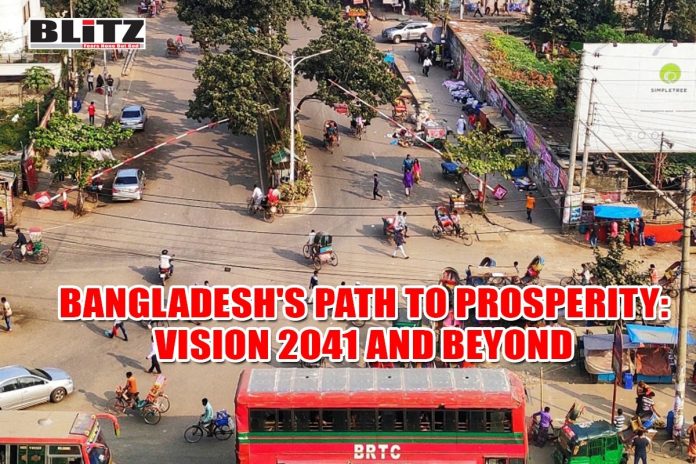As Bangladesh ambitiously charts its course towards Vision 2041, aiming to transform itself into a developed and prosperous nation, it stands at a critical juncture that demands a comprehensive and strategic approach to development. Achieving this vision necessitates a harmonized blend of economic growth, social advancement, democratic governance, and the promotion of fundamental freedoms. Recent political developments, particularly the consolidation of the dominant-party system following the January parliamentary elections, highlight the importance of balanced governance and resilient democratic institutions to steer the nation effectively through challenges.
Bangladesh has demonstrated commendable resilience in achieving economic prosperity; however, its progress is overshadowed by substantial challenges in the area of freedom, as reflected in declining global rankings. The diminishing indicators across political, legal, and economic sectors highlight a pressing need for focused reforms. Addressing these challenges is crucial to pave the way for sustained economic growth, ensure social development, and lay the groundwork for long-term prosperity.
Economic freedom stands as a vital cornerstone for prosperity, revealing both strides forward and areas requiring intervention in Bangladesh. The country has seen significant progress in economic governance, especially regarding investment freedom. Despite these advancements, challenges remain in pivotal sectors like property rights, trade freedom, and the empowerment of women in the economy. Addressing these challenges is essential to ensure a balanced and robust economic environment that fosters growth, innovation, and inclusivity.
Enhancing property rights holds immense significance in fostering entrepreneurship, facilitating long-term investment, and promoting economic stability within Bangladesh. Implementing improvements in land titling and registration systems, streamlining bureaucratic processes, and harnessing technological innovations are pivotal steps in strengthening property rights. These measures instill confidence among individuals and businesses, encouraging them to engage in productive ventures and innovative endeavors, thereby contributing to the overall economic growth and prosperity of the nation.
Trade freedom remains an area with untapped potential for Bangladesh. While progress has been made in reducing trade barriers, there’s a need for further revitalization of trade policies by lowering tariffs, eliminating quotas, and reducing administrative hurdles. By embracing a more open and transparent trade regime, Bangladesh can bolster its competitiveness on the global stage. This approach not only stimulates economic growth but also attracts foreign investment, fosters innovation, and opens up new avenues for both producers and consumers, driving overall prosperity.
Women’s economic empowerment remains a critical component of Bangladesh’s development agenda. Despite legislative reforms aimed at promoting gender equality in the workplace, significant disparities persist. Addressing legal gender barriers, ensuring equal rights and opportunities for women across various stages of their careers, and investing in initiatives that support women entrepreneurs are vital steps towards harnessing the untapped potential of half the population.
Investing in human capital and education stands at the core of Bangladesh’s strategy for prosperity. A workforce that is well-educated and skilled serves as a catalyst for innovation, boosts productivity, and propels economic growth forward. By prioritizing high-quality education, expanding vocational training initiatives, and championing lifelong learning opportunities, Bangladesh can empower its citizens with the essential skills and knowledge required to excel in a rapidly evolving global economy, ensuring sustained growth and competitiveness in the long run.
Promoting innovation and entrepreneurship stands as the linchpin to unleash Bangladesh’s economic prowess. Establishing an environment conducive to creativity, innovation, and the flourishing of startups and SMEs is essential for driving job creation, fostering economic diversification, and nurturing sustainable growth. By fostering a culture of research and development, facilitating financial access for startups, and simplifying regulatory procedures, Bangladesh can ignite entrepreneurial activities and invigorate economic dynamism, paving the way for a prosperous future.
Fostering social cohesion, inclusivity, and well-being stands as a cornerstone for sustainable development in Bangladesh. By investing in robust healthcare systems, strengthening social safety nets, and rolling out poverty alleviation programs, the nation can significantly elevate the quality of life for its citizens while narrowing the gap of inequality. Additionally, promoting cultural diversity, safeguarding minority rights, and ensuring governance that embraces inclusivity are pivotal steps toward building a resilient and harmonious society that thrives on unity and mutual respect.
On the path to prosperity, upholding the principles of democracy, human rights, and good governance remains non-negotiable for Bangladesh. A strong legal framework, buttressed by an independent judiciary and transparent, accountable institutions, plays a crucial role in upholding the rule of law. These pillars not only safeguard individual rights but also cultivate a culture of trust and confidence in governmental processes among the populace. As Bangladesh strives towards its vision of a developed nation by 2041, maintaining and strengthening these foundational elements will be instrumental in ensuring a prosperous and equitable future for all its citizens.
Bangladesh’s journey towards prosperity demands a comprehensive approach that tackles economic, social, governance, and freedom challenges holistically. By enacting targeted reforms, empowering women, investing in education and human capital, fostering innovation, and upholding democratic principles and good governance, the nation can chart a course towards its Vision 2041 of becoming a developed and prosperous nation. With a steadfast commitment to inclusive and sustainable development, Bangladesh has the potential to serve as a beacon of progress, resilience, and prosperity not only within the region but also on the global stage. By leveraging its strengths, confronting challenges head-on, and seizing opportunities, Bangladesh can pave the way for a brighter, more equitable future for all its citizens, setting a powerful example for nations worldwide.




